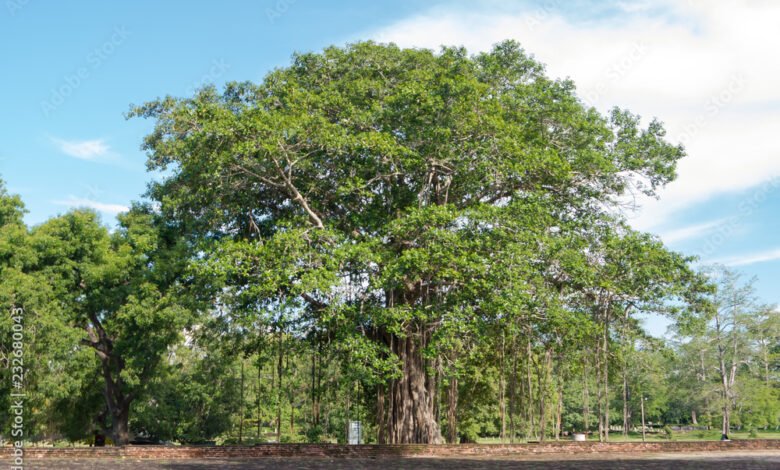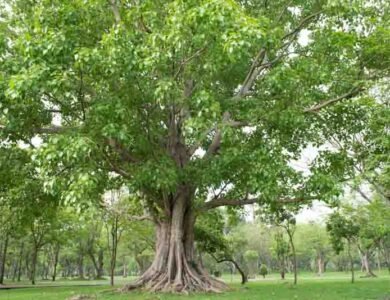Peepal Ficus Religiosa: The Sacred Fig Tree with Spiritual and Ecological Significance

Ficus religiosa, commonly known as the Peepal Tree, Sacred Fig, or Bodhi Tree, is a revered tree species native to the Indian subcontinent and Southeast Asia. With its large, glossy, heart-shaped leaves and unique religious significance, the Peepal tree has captivated the minds and hearts of people for centuries. This ancient tree holds profound cultural and spiritual meaning in various religions, especially in Hinduism, Buddhism, and Jainism. Beyond its religious importance, the Peepal tree is also recognized for its ecological and environmental contributions.
Key Features of Peepal Tree Ficus Religiosa
- Distinctive Heart-Shaped Leaves
The Peepal tree is easily recognized by its distinctive leaves. The large, glossy, heart-shaped leaves are typically 3-6 inches long and feature a long, pointed tip. These leaves are green, turning golden in autumn before shedding. The leaves of the Peepal tree are often symbolically significant in various cultures, representing prosperity, life, and vitality. - Aerial Roots
Like many members of the Ficus genus, the Peepal tree has aerial roots that grow from the branches and hang down to the soil. These roots not only provide support for the tree but also help it thrive in diverse environments. As the tree matures, its roots can extend downwards and spread, creating an impressive, dense root system. - Large Tree Size
Ficus religiosa is a large, deciduous tree that can grow up to 100 feet in height, with a canopy that can spread 30-50 feet. Its vast branches create a dense canopy that provides much-needed shade and shelter in tropical and subtropical climates. The Peepal tree is an important element in urban landscaping and is often planted near temples and sacred sites. - Fruits and Flowers
The Peepal tree produces small, fig-like fruits that are green when unripe, turning yellow or orange as they mature. These fruits are not typically eaten by humans but are consumed by various wildlife, including birds and small mammals. The tree’s flowers are inconspicuous and appear inside the fig-like fruits.
Spiritual and Religious Significance of Peepal Tree
The Ficus religiosa tree is considered sacred in several religions, making it a tree of great spiritual importance.
- Buddhism
The Peepal tree, known as the Bodhi Tree, holds the most profound spiritual significance in Buddhism. It is believed that Siddhartha Gautama, the historical Buddha, attained enlightenment under a Peepal tree in Bodh Gaya, India. Since then, the tree has been a symbol of wisdom, awakening, and inner peace. The Bodhi Tree remains a major pilgrimage site for Buddhists worldwide. - Hinduism
In Hinduism, the Peepal tree is also considered sacred and is associated with several deities, especially Vishnu, Shiva, and Brahma. The tree is often planted near temples or homes, with the belief that it provides prosperity, longevity, and spiritual blessings. The Peepal tree’s leaves are used in religious rituals and offerings, further solidifying its sacred status. - Jainism
The Peepal tree is also significant in Jainism, where it is believed to represent a symbol of life and interconnectedness. Jain texts mention the tree as a natural embodiment of ahimsa (non-violence) and karma, aligning with the Jain philosophy of peace and spiritual growth.
Growing and Caring for Peepal Tree Ficus Religiosa
Growing a Peepal tree is relatively easy, though it requires the right conditions to thrive:
- Climate and Light Requirements
The Peepal tree flourishes in tropical and subtropical climates. It prefers full sunlight but can tolerate partial shade. Ideally, it should be planted in a location with good air circulation and ample space to accommodate its large size. In cooler climates, the tree can be grown indoors in large pots with adequate sunlight. - Soil and Watering
Ficus religiosa grows well in a variety of soils, though it thrives in well-draining, loamy soils with a slightly acidic to neutral pH. While the tree is relatively drought-tolerant, it prefers moist soil during the growing season. Regular watering is necessary, especially during the dry months, but be sure not to overwater the tree to avoid root rot. - Temperature and Humidity
This tree thrives in warm temperatures ranging from 65-85°F (18-29°C). It is not frost-tolerant and should be protected from freezing temperatures. The Peepal tree prefers moderate to high humidity, which is why it grows so well in tropical areas. - Pruning and Maintenance
Peepal trees do not require much maintenance, but pruning can help maintain their shape and prevent excessive spreading. Prune dead or damaged branches to encourage healthy growth and prevent the tree from becoming too unruly. In urban settings, regular trimming may be necessary to prevent the tree from interfering with power lines or nearby structures.
Ecological and Environmental Benefits
Beyond its religious and spiritual importance, the Peepal tree plays a crucial role in the environment:
- Air Purification
The Peepal tree is known for its ability to improve air quality. As a large tree with dense foliage, it absorbs carbon dioxide and releases oxygen, helping to purify the air around it. It is often planted along roadsides and urban areas to reduce pollution and improve the overall air quality. - Wildlife Habitat
The fruits of the Peepal tree provide food for various birds, mammals, and insects. The dense canopy also offers shelter and nesting space for wildlife, making it an important tree for biodiversity in urban and rural areas. - Soil Erosion Control
The expansive root system of the Peepal tree helps in controlling soil erosion, especially in areas prone to heavy rainfall. The roots bind the soil together, preventing erosion and promoting soil stability in hilly or sloped areas.
Conclusion
The Peepal tree Ficus religiosa is a remarkable tree with spiritual, ecological, and environmental significance. Revered in Hinduism, Buddhism, and Jainism, the Peepal tree has been a symbol of enlightenment, prosperity, and wisdom for centuries. Whether grown for its religious importance, ecological benefits, or simply its majestic appearance, the Peepal tree is a tree that offers profound value to both nature and humanity.
By planting and caring for Ficus religiosa, we not only honor its cultural and spiritual significance but also contribute to a healthier environment, making the Peepal tree a true treasure for our planet.

